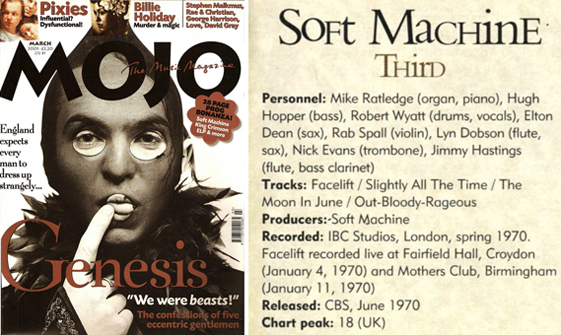| |
|
|
 New Model Army - Mojo - N° 88 - March 2001 New Model Army - Mojo - N° 88 - March 2001
 |
 |
THIRD, SOFT MACHINE'S TANTALISINGLY titled third LP, marked their full transformation from pop-psych Pink Floyd understudies to pofaced purveyors of complex jazz-rock epics. Out went paisley shirts and poetry, replaced by chinstroking, muso extravaganzas. "Mike Ratledge had studied classical music, including theory;" recalls bassist Hugh Hopper, "and Robert [Wyatt] was very into jazz, like we all were."
It was bassist/vocalist Kevin Avers who briefly steered the group towards psych-inspired pop for their debut album. "The songs went after Kevin quit, " Hopper says - and so, very nearly, did the hand. "We spent much of 1968 touring the States with Jimi Hendrix, but the group ceased to exist for the last half of the year," he recalls. "Kevin Ayers had gone, Robert stayed in California and planned a solo career - and besides, he and Mike weren't speaking."
Despite the acrimony. The Soft Machine regrouped, with Hopper replacing Ayers on bass (and sax), to record a contract-fulfilling second album. "It was still mainly songs, though Mike's stuff was already leaning towards instrumental pieces," Hopper explains. After supporting Hendrix and Traffic at the Albert Hall early in 1969, the trio were playing full-time again and in the autumn, at Wyatt's suggestion, experimented with a four-piece brass section. "This hastened the demise of our commitment to songs," says Hopper, "because the brass tended to play Robert's vocal parts."
By the time work began on Third, only Elton Dean from the enlarged group remained (the octet was trimmed after the live recording). Musically, though, the Softs were progressing nicely. "We weren't consciously playing jazz-rock," Hopper insists. "It was more a case of not wanting to sound like other bands; we certainly didn't want a guitarist." Rock was a dirty word.
The bassist's chief contribution was the extraordinary Facelift, a live/studio cocktail of jerky, Zappa-inspired riffs, squealing tape loops and hazardous keyboard solos. "It was bravado," Hopper claims. "We were making that music for ourselves, really."
Mike Ratledge's two pieces, Slightly All The Time and Out-Bloody-Rageous, were less abrasive but hugely ambitious ventures into full-blown jazz-rock at a time when that genre had barely learnt to walk.
Most memorable was Wyatt's The Moon in June, a virtuoso piece featuring probably the longest coda in rock and - gulp - vocals. "The myth was that we refused to play on it," Hopper says. "Actually, he'd originally recorded it in the States after the Hendrix tour. He simply knew how he wanted it to sound." A little over a year on, Wyatt was fired. "I loved playing their music," he says, "but one day I got a phone call from the organist and I was out."
MP
 |
|



